- Home
- Octavia E. Butler
Bloodchild and Other Stories Page 7
Bloodchild and Other Stories Read online
Page 7
He was still there when I found the tape in a kitchen drawer. He hadn’t moved except to take a paper out of the box. He sat reading it while I struggled to tape the box. It was awkward, but I didn’t expect him to help me unless I asked—any other male relative, perhaps, but not him.
“What is that?” I asked, glancing at the paper.
“One of your report cards. Fifth grade. Bad.”
“Oh God. Throw it out.”
“Don’t you wonder why she kept it?”
“No. She … I think I understood her a little. I think she liked having had a child—I don’t know, to prove her womanliness or something, and to see what she could produce. But once she had me, she didn’t want to waste her time raising me.”
“She had had four miscarriages before you, you know.”
“She told me.”
“And she did pay attention to you.”
“Sometimes. Like whenever I got one of those rotten report cards, she would come over and bawl me out.”
“Is that why you got them? To make her angry?”
“I got them because I didn’t care one way or the other—until the day you came over and bawled me out and scared the hell out of me. Then I started to care.”
“Wait a moment, I remember that. I wasn’t trying to scare you. I just thought you had a brain and weren’t using it, and I told you so.”
“You did. You sat there looking angry and disgusted, and I was afraid you’d given up on me altogether.” I glanced at him. “You see? Even if I wasn’t adopted, you were. I had to make sure I hung on to you.”
That got as much of a smile out of him as anything ever did, and the smile took years off him. He was fifty-seven now, slender, fine boned, still handsome. Everyone in my mother’s family was that way—small, almost fragile looking. It made the women attractive. I thought it made the men attractive too, but I knew it had caused my male cousins to spend too much of their time fighting and showing off, trying to prove they were men. It had made them touchy and defensive. I don’t know what it had done to this particular uncle when he was a boy, but he wasn’t defensive now. If you made him angry, he could deliver an icy verbal shredding. If that wasn’t enough, he could handle himself in a fight too—or he could when he was younger—but I had never seen him start trouble. My cousins disliked him, claimed he was ice-cold even when he wasn’t angry. When I disagreed with them, they told me I was cold too. What difference did it make? My uncle and I got along comfortably together.
“What are you going to do with her things?” he asked.
“Sell them, give them to the Salvation Army, I don’t know. Do you see anything you want?”
He got up and went into the bedroom, moving with that smooth, quick grace of his that time didn’t seem to touch. He came back with a picture from my mother’s dresser—an enlargement of a snapshot he had taken of my mother, grandmother, and me at Knott’s Berry Farm when I was about twelve. Somehow, he had gotten us together and taken us all out for a treat. The picture was the only one I knew of that contained the three of us.
“It would have been better if you had gotten into that photo too,” I said. “You should have had some stranger take the picture.”
“No, you three look right together—three generations. Are you sure you don’t want to keep this picture—or a copy of it?”
I shook my head. “It’s yours. Don’t you want anything else?”
“No. What are you going to do about that Oregon property? And I think she owned some in Arizona, too.”
“Everywhere but here,” I muttered. “After all, if she’d used her money to buy a house here, I might have moved in on her. Where did all that money come from anyway? She was supposed to be so damn poor!”
“She’s dead,” said my uncle flatly. “How much more time and energy are you going to waste resenting her?”
“As little as possible,” I said. “I can’t quite turn it off like a water faucet though.”
“Turn it off when I’m around. She was my sister and I loved her if you didn’t.” He said it very quietly, mildly.
“Okay.”
There was a silence until one of my aunts arrived. She hugged me when I let her in and cried all over me. I endured her because my mother had been her sister, too. She was a tiresome woman who used to visit my grandmother to talk about how gifted her own kids were while she patted me on the head and treated me like the family idiot.
“Stephen,” she greeted my uncle. He hated his first name. “What do you have there? A picture. Isn’t that nice. Barbara was so pretty then. She was always a beauty. So natural at the funeral …”
She wandered into the bedroom and began going through my mother’s things. At the closet, she sighed. She was at least twenty pounds heavier than my mother, though I could remember when they were the same size.
“What are you going to do with all these lovely things?” she asked me. “You should save some of them as keepsakes.”
“Should I?” I said. I was going to get rid of all of them as soon as possible, of course—bundle them off to the Salvation Army. But this aunt, who had disapproved self-righteously of my mother’s unmotherly behavior for years, would be outraged now if I seemed unsentimental about my mother’s things.
“Stephen, are you helping out?” my aunt asked.
“No,” said my uncle softly.
“Just keeping company, hmm? That’s nice. Is there anything I can do?”
“Nothing,” said my uncle—which was strange because the question had clearly been directed at me. She looked at him a little surprised, and he looked back expressionlessly.
“Well … if you need me for anything, you be sure and call me.” She had gathered up a few pieces of my mother’s jewelry. Now she grabbed the little black-and-white television. “You don’t mind if I take this, do you? My younger kids fight so much over the TV.…” She left.
My uncle looked after her and shook his head.
“She’s your sister, too,” I said, smiling.
“If she wasn’t … Never mind.”
“What?”
“Nothing.” That soft warning voice again. I ignored it.
“I know. She’s a hypocrite—among other things. I think she liked my mother even less than I did.”
“Why did you let her take those things?”
I looked at him. “Because I don’t care what happens to anything in this apartment. I just don’t care.”
“Well …” He took a deep breath. “You’re no hypocrite, at least. Your mother left a will, you know.”
“A will?”
“That property is fairly valuable. She left it to you.”
“How do you know?”
“I have a copy of the will. She didn’t trust anyone to find it in her things.” He waved a hand toward the cardboard box. “Her brand of filing wasn’t very dependable.”
I nodded unhappily. “It sure wasn’t. I don’t have any idea what she has here. But look, isn’t there anyway you could take that property? I don’t want it.”
“She wanted to do something for you. Let her do it.”
“But …”
“Let her do it.”
I drew a deep breath, then let it out. “Did she leave you anything?”
“No.”
“That doesn’t seem right.”
“I’m content—or I will be when you take what she’s given you. There’s some money, too.”
I frowned, unable to imagine my mother saving any money. I hadn’t even found out about the property until I began going through her things. The money was a little too much. But, at least, it gave me the opening I needed. “Is this money from her,” I asked him, “or from you?”
He hesitated just for a second, then said, “It’s in her will.” But there was something wrong with the way he said it—as though I’d caught him a little off guard.
I smiled, but stopped when that seemed to make him uncomfortable. I didn’t want to make him uncomfortable. I was going to—I had to
—but I didn’t look forward to it or take any pleasure in it.
“You’re not devious,” I told him. “You look as though you could be. You look secretive and controlled.”
“I can’t help the way I look.”
“People tell me I look that way, too.”
“No, you look like your mother.”
“I think not. I think I look like my father.”
He said nothing, just stared at me, frowning. I fingered a few of the dog-eared papers in the box. “Shall I still take the money?”
He did not answer. He only watched me in that way of his that people called cold. It wasn’t—I knew what he was like when he was really cold. Now, it was more as though he were in pain, as though I were hurting him. I supposed I was, but I couldn’t stop. It was too late to stop. I pressed my fingers nervously into the jumble of papers, then looked down at them for a moment, suddenly resenting them. Why hadn’t I stayed at college and left them, left everything to other relatives the way she had always left me to other relatives? Or, having come here like a responsible daughter to wind up my mother’s affairs, why hadn’t I done just that and kept my mouth shut? What would he do now? Leave? Would I lose him, too?
“I don’t care,” I said not looking at him. “It doesn’t matter. I love you.” I had said that to him before dozens of times, obscurely. But I had never said it in just those three words. It was as though I were asking permission somehow. Is it all right for me to love you?
“What have you got in that box?” he asked softly.
I frowned for a moment, not understanding. Then I realized what he thought—what my nervousness had made him think. “Nothing about this,” I said, “at least nothing that I know of. Don’t worry, I don’t think she would have written anything down.”
“Then how did you know?”
“I didn’t know, I guessed. I guessed a long time ago.”
“How?”
I kicked at the box. “There were a lot of things,” I said. “I guess the easiest one to explain is the way we look, you and I. You should compare one of Grandmother’s pictures of you as a young man with my face now—we could be twins. My mother was beautiful; her husband, from his pictures, was a big, handsome man—me … I just look like you.”
“That doesn’t have to mean anything.”
“I know. But it meant a lot to me, together with some other less tangible things.”
“A guess,” he said bitterly. He leaned forward. “I’m really not very devious, am I?” He stood up, started toward the door. I got up quickly to block his way. We were the same height, exactly.
“Please don’t go,” I said. “Please.”
He tried to put me aside gently, but I wouldn’t move.
“Say it?” I insisted. “I’ll never ask you again, nor will I ever repeat it. She’s dead; it can’t hurt her anymore.” I hesitated. “Please don’t walk away from me.”
He sighed, looked at the floor for a moment, then at me. “Yes,” he said softly.
I let him go and found myself almost crying with relief. I had a father, then. I didn’t feel as though I’d ever had a mother, but I had a father. “Thank you,” I whispered.
“No one knows,” he said. “Not your grandmother, not any of the relatives.”
“They won’t find out from me.”
“No. I never worried about your telling others. I never worried about others except for the pain they might cause her and you—and the pain it might cause you … to know.”
“I’m not in pain.”
“No.” He looked at me with what seemed to be amazement and I realized that he had been at least as frightened as I had.
“How did she have her husband’s name put on my birth certificate?” I asked.
“By lying. It was a believable lie—her husband was alive when you were conceived. He had left her, but the family didn’t find out about that until later, never found out about the timing.”
“Did he leave because of you?”
“No. He left because he had found someone else—someone who had borne him a live child instead of having a miscarriage. She came to me when he left—came to talk, to cry, to work out some of her feelings.…” He shrugged. “She and I were always close—too close.” He shrugged again. “We loved each other. If it had been possible, I would have married her. I don’t care how that sounds, I would have done it. As it was, we were afraid when she realized she was pregnant, but she wanted you. There was never any question about that.”
I didn’t believe him, even now. I believed what I had said before—that she had wanted a child to prove she was woman enough to have one. Once she had her proof, she went on to other things. But he had loved her and I loved him. I said nothing.
“She was always afraid you would find out,” he said. “That was why she couldn’t bring herself to keep you with her.”
“She was ashamed of me.”
“She was ashamed of herself.”
I looked at him, trying to read his unreadable face. “Were you?”
He nodded. “Of myself—never of you.”
“But you didn’t just drop me the way she did.”
“She didn’t drop you either; she couldn’t. Why do you think she was so upset when you asked her if you were adopted?”
I shook my head. “She should have trusted me. She should have been more like you.”
“She did the best she could as herself.”
“I would have loved her. I wouldn’t have cared.”
“Knowing you, I think you might not have. She couldn’t quite believe that though. She couldn’t take the chance.”
“Do you love me?”
“Yes. So did she, though you don’t believe it.”
“She and I … we should have gotten to know each other. We never did, really.”
“No.” There was silence, and he looked over at the box of papers. “If you find anything in there that you can’t handle, bring it to me.”
“All right.”
“I’ll call you about the will. Are you going back to school?”
“Yes.”
He gave me one of his small smiles. “Then you’ll need the money, won’t you? I don’t want to hear any more nonsense about your not taking it.” He left, closing the door silently behind him.
Afterword
First of all, “Near of Kin” has nothing to do with my novel Kindred. I said this to the editor who originally accepted the story for his anthology, but all he remembered was that I had two works with similar titles, and therefore, they must be related. Not at all.
“Near of Kin” grew from my Baptist childhood and my habit, even then, of letting my interests lead me wherever they would. As a good Baptist kid, I read the Bible first as a series of instructions as to how I should believe and behave, then as bits of verse that I was required to memorize, then as a series of interesting, interconnected stories.
The stories got me: stories of conflict, betrayal, torture, murder, exile, and incest. I read them avidly. This was, of course, not exactly what my mother had in mind when she encouraged me to read the Bible. Nevertheless, I found these things fascinating, and when I began writing, I explored these themes in my own stories. “Near of Kin” is one of the odder results of this interest. I remember trying to write it when I was in college, and failing. The idea stayed with me, demanding to be written: A sympathetic story of incest. My examples were Lot’s daughters, Abraham’s sister-wife, and the sons of Adam with the daughters of Eve.
Speech Sounds
There was trouble aboard the Washington Boulevard bus. Rye had expected trouble sooner or later in her journey. She had put off going until loneliness and hopelessness drove her out. She believed she might have one group of relatives left alive—a brother and his two children twenty miles away in Pasadena. That was a day’s journey one-way, if she were lucky. The unexpected arrival of the bus as she left her Virginia Road home had seemed to be a piece of luck—until the trouble began.
Two young men w
ere involved in a disagreement of some kind, or, more likely, a misunderstanding. They stood in the aisle, grunting and gesturing at each other, each in his own uncertain T stance as the bus lurched over the potholes. The driver seemed to be putting some effort into keeping them off balance. Still, their gestures stopped just short of contact—mock punches, hand games of intimidation to replace lost curses.
People watched the pair, then looked at one another and made small anxious sounds. Two children whimpered.
Rye sat a few feet behind the disputants and across from the back door. She watched the two carefully, knowing the fight would begin when someone’s nerve broke or someone’s hand slipped or someone came to the end of his limited ability to communicate. These things could happen anytime.
One of them happened as the bus hit an especially large pothole and one man, tall, thin, and sneering, was thrown into his shorter opponent.
Instantly, the shorter man drove his left fist into the disintegrating sneer. He hammered his larger opponent as though he neither had nor needed any weapon other than his left fist. He hit quickly enough, hard enough to batter his opponent down before the taller man could regain his balance or hit back even once.
People screamed or squawked in fear. Those nearby scrambled to get out of the way. Three more young men roared in excitement and gestured wildly. Then, somehow, a second dispute broke out between two of these three—probably because one inadvertently touched or hit the other.
As the second fight scattered frightened passengers, a woman shook the driver’s shoulder and grunted as she gestured toward the fighting.
The driver grunted back through bared teeth. Frightened, the woman drew away.
Rye, knowing the methods of bus drivers, braced herself and held on to the crossbar of the seat in front of her. When the driver hit the brakes, she was ready and the combatants were not. They fell over seats and onto screaming passengers, creating even more confusion. At least one more fight started.
The instant the bus came to a full stop, Rye was on her feet, pushing the back door. At the second push, it opened and she jumped out, holding her pack in one arm. Several other passengers followed, but some stayed on the bus. Buses were so rare and irregular now, people rode when they could, no matter what. There might not be another bus today—or tomorrow. People started walking, and if they saw a bus they flagged it down. People making intercity trips like Rye’s from Los Angeles to Pasadena made plans to camp out, or risked seeking shelter with locals who might rob or murder them.

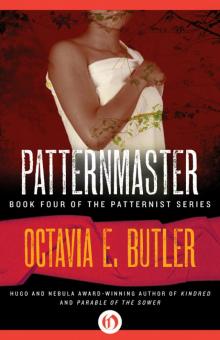 Patternmaster
Patternmaster Survivor
Survivor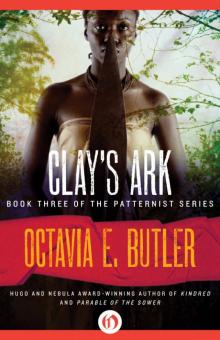 Clay's Ark
Clay's Ark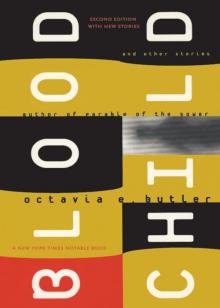 Bloodchild and Other Stories
Bloodchild and Other Stories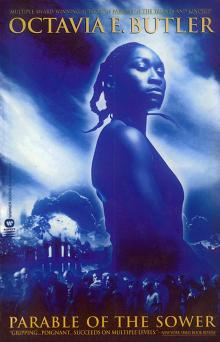 Parable of the Sower
Parable of the Sower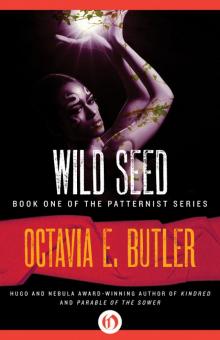 Wild Seed
Wild Seed Fledgling
Fledgling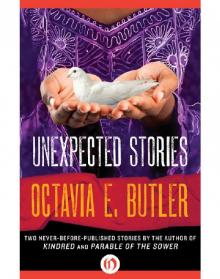 Unexpected Stories
Unexpected Stories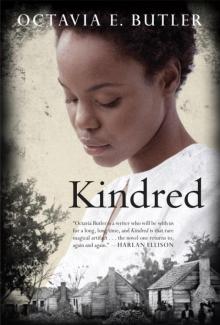 Kindred
Kindred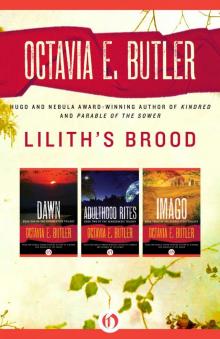 Lilith's Brood: Dawn / Adulthood Rites / Imago
Lilith's Brood: Dawn / Adulthood Rites / Imago Adulthood Rites
Adulthood Rites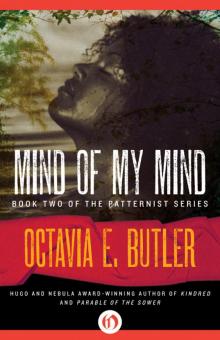 Mind of My Mind
Mind of My Mind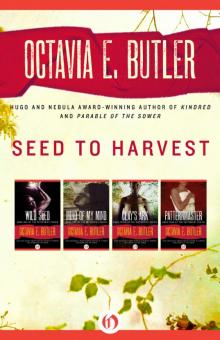 Seed to Harvest
Seed to Harvest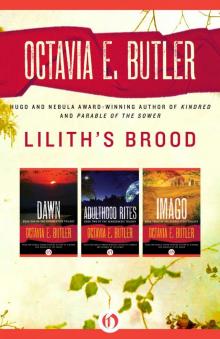 Lilith's Brood: Dawn, Adulthood Rites, and Imago (Xenogenesis Trilogy)
Lilith's Brood: Dawn, Adulthood Rites, and Imago (Xenogenesis Trilogy) Bloodchild
Bloodchild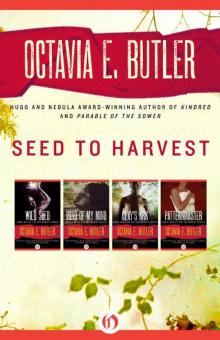 Seed to Harvest: Wild Seed, Mind of My Mind, Clay's Ark, and Patternmaster (Patternist)
Seed to Harvest: Wild Seed, Mind of My Mind, Clay's Ark, and Patternmaster (Patternist)